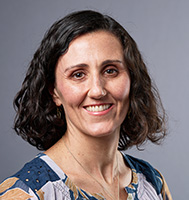Q&A with Marisa Brant, MD, visiting associate professor, Division of Neonatology and Newborn Nursery
 Hometown: Evanston, Illinois
Hometown: Evanston, Illinois
Educational/professional background: I earned my BA in Spanish and anthropology from Washington University in St. Louis and subsequently graduated from Saint Louis University School of Medicine. I completed my pediatrics residency and my neonatal-perinatal fellowship at the Children’s Hospital of Philadelphia (CHOP) in Philadelphia, Pennsylvania.
Previous position (title, institution): Neonatologist at CHOP Newborn Care at Pennsylvania Hospital, clinical assistant professor of pediatrics, University of Pennsylvania School of Medicine.
What is your field of research or area of clinical care, and how did you get into it? My primary area of clinical interest centers on supporting and empowering families through challenging neonatal experiences, with a strong focus on perinatal palliative care and substance-exposed newborns. My commitment to family empowerment has been present throughout my medical training and continues to drive my work. I helped develop a Perinatal Palliative Care Program at Pennsylvania Hospital, where our multidisciplinary team supports families with neonates or pregnancies affected by life-limiting conditions. Additionally, my dedication to empowering parents in the NICU has fueled my efforts to improve care for substance-exposed newborns. I played an important role in implementing the Eating, Sleeping, Consoling (ESC) approach for neonatal opioid withdrawal syndrome, and I contributed to various initiatives and committees dedicated to this high-risk population.
How would you describe your work to a 5-year-old? I am a baby doctor who gets to take care of the smallest and sometimes super sick babies. I help these babies get big and healthy so they can go home with their families.
What attracted you to UW–Madison? Having grown up outside of Chicago, the opportunity for my husband and me to advance our careers in academic medicine at a major university in the Midwest was particularly appealing. We were also very excited about the prospect of achieving a better work-life balance in a city that offers a wealth of outdoor activities and family-friendly events.
What is your favorite thing to do in Madison? I love exploring the incredible bike trails around Madison, taking advantage of the many boating and water activities, and exploring new restaurants and local sporting events with my family.
What’s one thing you hope trainees will learn from you and your work? In neonatology, as in pediatrics overall, caring for the entire family is paramount. The relationships we build with families are crucial to the outcomes of the neonates we serve. It’s important to remember that supporting these infants and their families during their most vulnerable moments is a privilege, and we must approach this responsibility with empathy and compassion.
Do you feel your work relates to the Wisconsin Idea? If so, please describe how. As neonatologists, I believe we have a responsibility to educate both our trainees and the families of the infants we care for. This education prepares our trainees to deliver high-quality care to neonates across the country and beyond while also empowering families to support their infants in leading full and meaningful lives.
What’s something interesting about your area of expertise you can share that will make us sound smarter during parties? Kangaroo care is a practice where parents hold their premature babies skin-to-skin, resembling how kangaroos carry their young. Even the smallest and most fragile infants, including those weighing as little as one pound, can benefit from this practice. It has been shown to improve bonding, regulate the baby’s temperature, and even promote faster weight gain.
What are some of your hobbies and other interests? I’m passionate about the outdoors and sports. I enjoy running, biking, snowboarding, and doing yoga. I’m an avid sports fan who loves both watching and participating in a variety of sports, including soccer, lacrosse, football, and hockey.